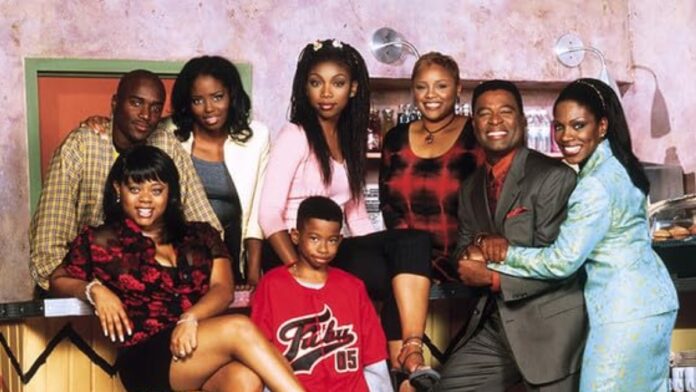The black sitcom inherently revolves around the concept of family, whether exploring the nuclear family, the workplace family, or a circle of friends as a surrogate family.
Gerard Jones argues that the sitcom’s fundamental structure is rooted in notions of the family and domesticity, following a narrative pattern where “domestic harmony is threatened when a character develops a desire that runs counter to the group’s welfare, or misunderstands a situation due to poor communication, or contacts a disruptive outside element.”
Because of the episodic nature of sitcoms, the problem-solution-return-to-stasis narrative arc must be maintained (with the exception of two-part episodes).
For black sitcoms featuring episodic black gay characters, the problem is homosexuality, which must be expelled and rejected to restore the family unit to its equilibrium.
This analysis aligns with Jones’ assertion and sitcom genre theory, focusing on Moesha, a black sitcom centered on a nuclear family that features an episode with a black gay male character.
Additionally, Stephen Tropiano’s work on the “Coming Out” Episode is considered, suggesting that “once the message [about homosexuality] is delivered, the gay character… typically disappears and, in most cases, is never seen, heard, or mentioned again.”
In other words, when homosexuality is introduced in a black sitcom, it must be discarded after it has sufficiently disrupted the lives of the series regulars, been resolved, and returned the series to a state of heteronormativity.
To clarify, the term “black sitcom” in this presentation is operationalized as described by scholars like Robin R. Means Coleman, Charlton D. McIlwain, and Angela M. S. Nelson.
It refers to programming that features a core cast of African-American characters and explores their sociocultural, political, and economic experiences.
Additionally, black sitcoms often have a black producer, writer, or director and explicitly address Black or African-American audiences while focusing on issues such as racism.
With this context in mind, I will now delve into the Moesha episode “Labels” as a case study.
This episode, featuring a gay character, aligns with the definition of a black sitcom as it predominantly showcases a black cast and is penned by a black gay writer, Demetrius Bady.
The narrative explores how the possibility of a character, Omar, being gay affects the dynamics of a family of friends, where Moesha plays a central role.
Importantly, the episode does not explicitly disclose Omar’s sexual orientation, reflecting Bady’s belief that such disclosures are unnecessary.
Instead, the focus is on the impact of Moesha’s actions and rumors on her relationships.
Homosexuality is presented as a narrative challenge that disrupts the family of friends.
This clip illustrates the necessity of addressing homosexuality to restore the heteronormative relationships within the family of friends.
Without the introduction of Hakeem and his “questionable” sexuality, Omar and Moesha would have maintained their friendship.
Demetrius Bady, the episode’s writer, enjoyed the rare privilege of crafting the episode without receiving any notes from the executive producer or the network regarding its content.
He speculates that the absence of interference stemmed from the desire of series executives and the writing staff to claim that they had addressed the “gay story,” thereby rendering it no longer a relevant issue for the series regulars.
Consequently, Moesha successfully confined homosexuality to a single episode, allowing the series to continue promoting a heterosexist concept of both the domestic family and the family of friends.
Moesha strategically contains homosexuality in episodic narratives that briefly challenge the conventional understanding of a black family.
The treatment of homosexuality as an issue to be addressed episodically implies that black gay men are only permitted to appear in single episodes, predominantly focusing on their coming-out narratives.
This further solidifies the idea that black gayness is considered external to the black family.
In essence, the executive producers of Moesha and similar shows suggest that gayness does not have a place at the black family table.
Contemporary sitcoms with primarily white casts, such as “Will and Grace,” “Ellen,” “Spin City,” “Happy Endings,” and “The New Normal,” handle gay themes differently, avoiding the “very special” episode format.
In this regard, black-cast sitcoms appear to lag behind in addressing issues related to homosexuality.
Despite the efforts of writers like Demetrius Bady, the answer to whether black gay men can be integrated into the televised black family remains a resounding no.
You Might Like To Read: Review: Miami Vice, “The Home Invaders” and “Nobody Lives Forever”


